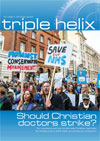New test creates more problems than it solves
Review by Rick Thomas CMF Public Policy ResearcherThe UK National Screening Committee (NSC) is recommending a new test for pregnant women that will detect a higher proportion of fetuses with Down Syndrome. (1) The test is performed around ten weeks, is non-invasive and makes use of cell free DNA from the fetus (cfDNA) circulating in the mother's blood. It is far more accurate than present early pregnancy screening tests for Down's, meaning there would be far fewer false positives and far fewer women going forward for invasive tests to confirm the condition - procedures that may result in the inadvertent miscarriage of a healthy fetus.
So, at first sight, it looks like a good thing. But look closer and a very different picture emerges. First, the numbers. The number of inadvertent miscarriages saved would be far outnumbered by the predicted increase in detection and subsequent abortion of babies with Down's. And if, as seems likely, public demand eventually results in the new test being made available to all pregnant women (and not just to those already shown to be at risk, as is being proposed) the rates of detection, confirmatory invasive testing, abortion and inadvertent miscarriage will all spiral upwards.
Second, international conventions, guidelines and UK law. The World Health Organisation screening guidelines require that 'there should be a treatment for the condition'. (2) Prenatal screening for Down's provides no benefit to the fetus - most will be aborted. The Convention on the Rights of Persons with Disabilities (CRPD), (3) signed by the UK in 2007, requires health policies to respect the inherent dignity of persons with disability. The UN International Bioethics Committee comments: 'The widespread use of genetic screening and in particular of [the new test] may foster a culture of "perfectionism" or "zero defect" and even renew some "eugenic trends", with the consequence that it could become more and more difficult to accept imperfection and disability as a part of normal human life and a component of the diversity we are all called on to acknowledge and respect.' (4)
To assume Ground E provision of the UK Abortion Act (5) should automatically apply to Down Syndrome is to stretch the law to the point of completely misshaping it. Many people with Down's live into their 50s and 60s, finding fulfilment and contributing greatly to family and community life.
The Christian ethic calls the strong to make sacrifices for the weak, recognises and respects the value of every person, regardless of ability or disability, and energises the virtues of patience, perseverance and altruism. Caring for children and adults with special needs fosters compassion in the community and a more sacrificial society - a prize beyond price.
































